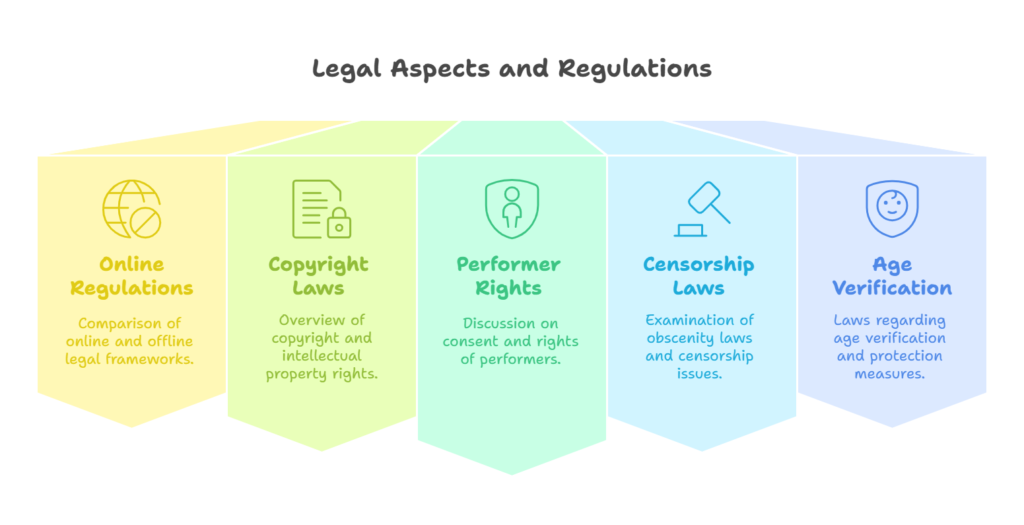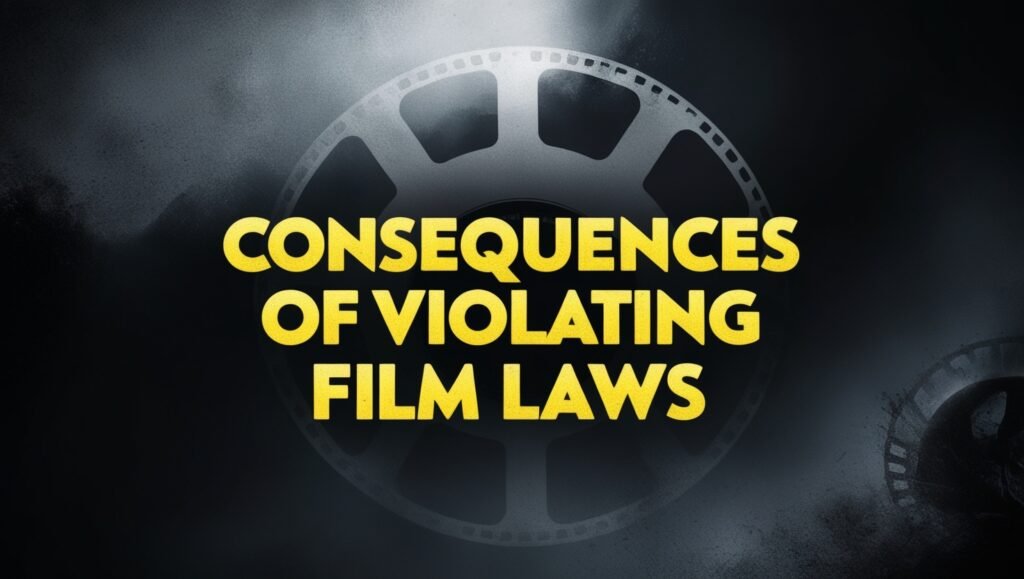Summary –
Pornography laws vary greatly across the world—some countries have clear rules to protect performers and ensure ethical production, while others enforce strict bans. This blog breaks down everything you need to know about film pornography laws, including what counts as legal vs illegal content, performer rights, age verification, censorship, copyright issues, and the latest legal changes in 2025. Whether you’re a content creator, legal professional, or just curious, understanding these laws is essential to avoid trouble and stay informed.
INTRODUCTION –
All of us have heard about Film Pornography. Film Pornography has been a subject of legal debate for decades like for centuries. Different laws vary significantly across different countries. There are some regions which have well defined regulations making sure the ethical production and rights of performers. While others impose very strict censorship or outright bans.
Understanding film pornography laws is very important for all, either for industry professionals, content creators, legal experts, and consumers to avoid legal complications.
In this article we will explore the legal framework surrounding film pornography, film pornography laws covering global regulations, key restrictions, performer rights, and recent legal changes in 2025.
The Legal Definition of Film Pornography
Let’s first understand what exactly is Film Pornography ? And Its Legal definition too.
Film pornography is broadly defined as sexually explicit content produced for distribution and consumption, which is typically through digital platforms, DVDs, films or streaming services. However, the legal recognition and classification of pornography vary widely:
- Legal Pornography: Adult films produced under consensual agreements with verified performers, adhering to national censorship and age restriction laws.
- Illegal Content: Includes child pornography, non-consensual acts, revenge porn, extreme or violent content, and materials that violate national obscenity laws.
Governments often regulate pornography based on age restrictions, consent, and community standards, making it crucial for producers to comply with regional laws to avoid criminal liability.
Global Overview of Film Pornography Laws

United States
- Legal but highly regulated with federal and state laws.
- Obscenity laws restrict certain content based on the Miller Test (what is deemed “obscene” by local standards).
- 2257 Record-Keeping Laws: Require producers to verify and maintain proof of performer age.
- California’s Performer Protection Laws: Advocate for condom use and workplace safety regulations.
United Kingdom
- The Digital Economy Act requires strict age verification for access to adult content.
- The British Board of Film Classification (BBFC) enforces content ratings, with restrictions on extreme material.
- Pornographic material must comply with consent laws, ensuring no coercion or exploitation.
European Union
- GDPR (General Data Protection Regulation) impacts the adult industry, requiring strict data privacy and age verification measures.
- Some EU countries have loose restrictions, while others like Germany and France enforce strict content regulations.
Canada & Australia
- Canada follows a classification system where explicit content must not depict non-consensual or violent acts.
- Australia has strict content bans on certain fetish content and enforces age verification laws.
Asia & Middle East
- China and India have outright bans on pornography production and distribution.
- Japan allows pornography but censors genitalia due to obscenity laws.
- Middle Eastern countries enforce harsh penalties for both creators and consumers of adult content.
Latin America & Other Regions
- Countries like Brazil and Mexico have legal but loosely regulated pornography industries.
- Enforcement of copyright laws and performer protection remains inconsistent.
You can further read this detailed article about other adult film industry regulations according to different countries and places.
Key Legal Aspects and Regulations

- Age Verification & Protection Laws
All performers must be 18+ and provide government-issued ID verification. Some countries require third-party verification systems to prevent underage involvement.
- Obscenity Laws & Censorship
Content must not violate moral, religious, or cultural standards set by local laws. Many governments ban extreme content such as simulated violence or non-consensual acts.
- Consent & Performer Rights
Legal contracts are mandatory to ensure consent and fair compensation for performers. Laws protect performers from harassment, exploitation, and unsafe working conditions.
- Copyright & Intellectual Property
Unauthorized distribution or piracy of adult films is punishable under copyright laws. Content creators can take legal action against illegal reproduction or leaks.
You can further read this article which discusses a district court decision affirming that works with minimal originality, even those containing obscene content, are still eligible for copyright protection.
- Online vs. Offline Regulations
Streaming services must comply with country-specific laws (e.g., geo-blocking restricted content). Digital platforms like OnlyFans and Pornhub implement stricter verification and content moderation.
Recent Legal Changes & Developments (2024-2025)
- AI-Generated Pornography Laws: Many governments have banned non-consensual AI-generated content (deepfakes).
- Stronger Age Verification Policies: More countries now mandate government-backed verification for adult sites.
- Worker Protection Laws: Stricter workplace safety regulations are being enforced to protect performers.
The Debate: Regulation vs. Free Speech
- Supporters of strict laws argue that regulation prevents exploitation, illegal content, and abuse.
- Opponents claim that excessive regulation infringes on free speech and personal liberties.
- The challenge remains in finding a balance between legal oversight and industry freedom.
Consequences of Violating Film Pornography Laws

- Fines and Imprisonment: Illegal content production or distribution can result in severe penalties.
- Website Bans & Censorship: Many governments block or restrict access to non-compliant adult websites.
- Industry Blacklisting: Non-compliance with performer protection laws can lead to legal action and reputation damage.
Conclusion
The legal landscape of film pornography is constantly evolving, with new regulations shaping how content is produced, distributed, and consumed. While these laws aim to protect performers, prevent illegal activities, and regulate the industry, challenges remain in balancing free expression and public morality.
As we enter 2025, staying informed about film pornography laws is crucial for creators, businesses, and consumers to avoid legal risks and ensure ethical industry practices.
For more such amazing and detailed Articles and blogs , visit our website’s blog section at Pornography Laws.
![You are currently viewing Film Pornography Laws – Regulations and Legal Boundaries [2025]](https://pornography-laws.com/wp-content/uploads/2025/02/Leonardo_Phoenix_09_A_professionallooking_feature_image_with_a_0.jpg)


![Read more about the article What is Illegal To Watch On The Internet In USA?[2025 Updated]](https://pornography-laws.com/wp-content/uploads/2024/12/Leonardo_Phoenix_10_A_dramatic_highcontrast_image_with_a_bold_0-1-1-300x170.jpg)
